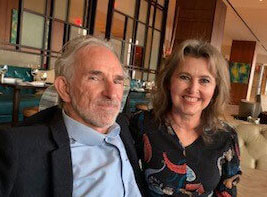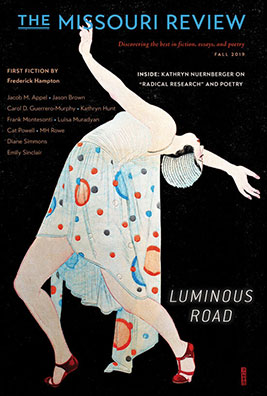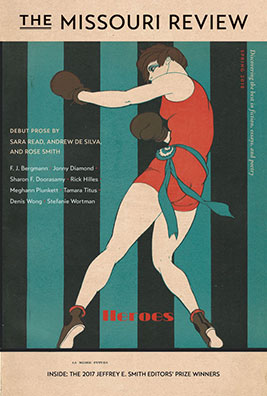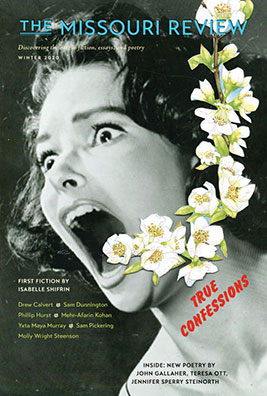
Interview with the Missouri Review's Kris Somerville and Speer Morgan
 |
Where did you each grow up?
KS: I grew up in Libertyville, Illinois, which is a North Shore suburb of Chicago. When I was a teenager in the late ’70s, my mother and stepfather bought a resort on Table Rock Lake in Shell Knob, Missouri. I never quite got over the culture shock. It was like a blast from the past—1950s rural America. No cable television and a party line. Large swaths of the Ozarks were simply untouched by modern civilization. But the scenery was beautiful, and I learned how to waterski.
SM: I grew up in Fort Smith, Arkansas, at the foot of the Ozark Mountains.
What were your childhoods like?
KS: I had what I call, “the tale of two childhoods.” My parents divorced when I was five. I spent my summers in San Antonio, Texas, with my father who was upper-middle class. I got horseback riding lessons, modeling lessons, acting lessons—a lot of lessons. We went on a lot of adventures to Mexico and across the United States. I vividly remember the bullfight he took me to where I became hysterical and also a boxing match I didn’t like very much. But mostly we had fun.
My mother and stepfather were business poor. Everything they made went back into the resort. So while I lived with them during the school year, I cleaned cabins and worked in a café on weekends and after school. My mother bought me clothes from Walmart, and my father bought me clothes from Lord and Taylor and Marshall Fields. The difference in the quality of my clothes embodies for me the two childhoods I moved between for about a decade.
SM: When I was six years old, my parents built a motel out on the highway as a second business, with the house behind. My parents also started a building supply company. My brother Charles and I shared the same little bedroom, and we rented rooms and cleaned up around the motel.
When we were old enough to drive, we both began working for the building supply—delivering doors and windows to housing sites in northwest Arkansas, welding door and window frames, and unloading plywood from boxcars. My school chums during those years were a close group from all economic brackets. We had active social lives, with maybe a little too much hellraising. Many of us are still pals.
 |
Who is/was an influential person in your lives (MU or otherwise)?
KS: Well, my husband Speer Morgan has been very influential. My undergraduate creative writing professor, Paul Gianoli, had been a student of Speer’s during the 1970s—a time when the English department and the creative writing program was a hotbed of talent. Paul brought a copy of the Missouri Review to class one day, and I was hooked. I had never seen a literary magazine before. When I graduated from College of the Ozarks and moved to Columbia for graduate school, I went straight to the Missouri Review. That was 30 years ago. I have never left.
Also, my father was important. He had unfulfilled artistic aspirations but, most important, was a lifelong reader. He fueled my interest in the literature of the 1920s, including the Weimar Era. He lived in Berlin, Germany, off and on and had a real romance with that city, as I do today. I used to wonder if he was a spy since he was always visiting East Berlin before the wall came down. I have a lot of his passport pictures, and he looks like a character out of a John le Carré novel. He was a handsome and charming man.
SM: One important early influence in my life was Wendell Berry, a now famous Kentucky writer who taught the writing workshop at Stanford, where I went to graduate school. Wendell put up with my early attempts at writing fiction. When I took my first (and last) job at MU, William Peden helped guide me through my early years of teaching and also helped serve as a kind of ongoing godfather when Larry Levis, Marcia Southwick, and I decided to start the Missouri Review.
Who or what led you to your specific areas of study?
KS: I fell into majoring in English. Rather than declaring a major, I only took classes I was interested in. I attended undergrad for five years. Finally, when I sat down with my advisor (who had been hands-off), I had an English major with a speech and theater minor. Fortunately, I was working and paying for my own education, so no one had the right to ask me, “What do you want to do with your life?” It was all up to me.
SM: I started reading kind of in secret when I was about 12 or 13. Through high school I continued to attack as many great authors as I could. It seemed almost an organic urge, since I really didn’t have friends to talk to about Thomas Mann, Faulkner, and so on. My first two years of college were at the University of the South, where sophomore English consisted of reading The Iliad and The Odyssey, the entire Divine Comedy, and even that didn’t turn me off. I loved it, even walking line by line through the circles of Hell.
 |
What challenges/obstacles did you each face in school, if any?
KS: While growing up in the suburbs of Chicago, I went to an experimental grade school—a school without walls. You were allowed to make your own daily schedule. It was too much freedom for a little kid, and I floundered. Then, when I moved to rural Missouri, my education really stalled. Poor country schools have real challenges, mostly relating to money. Fortunately, when I attended College of the Ozarks, my professors were patient and supportive. I don’t know how many times I heard, “You have plenty of literary sensitivity; you simply lack technical knowhow.” I am still friends with all my English professors today.
SM: I was lucky in that I loved the milieu of learning, no matter how flawed it was at any given point—or how flawed I was. I had different periods when I tried to do too much of this or that—for example, drinking in the first years of college. Try hard as I could, though, it didn’t stick.
What fond memories do you have of MU?
KS: I had great friends and teachers when I was a graduate student in the English and creative writing department. Many of those people are still in my life. My former classmates have done amazing things: published books, edited journals, won countless awards. And, of course, working on the Missouri Review has given me a rich and rewarding life.
SM: Many of my favorite moments at MU were with the magazine, discovering new or early work by authors, some of whom have gone on to fame. Starting and working on the “Found Text” and “History as Literature” series, in which we publish previously unpublished work by important authors or fascinating diaries from some historical time. That work has involved going to research libraries around the world and finding the documents.
One of my favorites was the feature we did after researching the publisher of Knopf’s papers at the Ransom Library at Texas. We found a fascinating group of rejections of manuscripts that went on to become classic books. The most interesting theme was that they didn’t show the editors at Knopf as “dumb” for making those rejections—since in many cases they were entirely reasonable; they demonstrated the uncertainty in the work of literary editing. After we published that feature, several editors at Knopf contacted us and mentioned how fascinated they were with their own publishing house’s methods in the 1940s through the 1960s.
What were your first jobs out of college? Do you have a favorite or most rewarding job?
KS: While I was in graduate school, I worked for the Total Person Program coordinating the tutoring for the football program. At the same time, I was a dorm mother at Stephens College living with the male actors and dancers who attended at the time. I grew up with two older brothers, so I was used to being around young men. I don’t know if this is a good quality or not, but I have a high threshold for wild, noisy behavior.
SM: Out of college I went straight to grad school and during the summers stayed in the Bay Area, working for a rare book dealer. Then I took my first job at MU.
 |
How did you both meet?
KS: We met when I walked into the office of the Missouri Review and asked to be an intern. Speer said to me, “How do I know you can write?” I gave him a short story and had to wait a summer to find out if I could take the internship in the fall of 1990.
SM: We worked together as straight colleagues and eventually friends for over a decade before we became a couple.
What do you hope to see in MU’s future?
KS: I love the arts. As far as I am concerned, MU can’t invest enough in the arts. I believe it’s what will heal and unite us when the pandemic subsides. And I am a strong advocate for a liberal arts education, which has been gutted at so many short-sighted academic institutions.
SM: I see the great hope in students. I have taught here a long time, and whatever changes the university has gone through, whatever ups and downs, whatever failures we have sometimes made—and doesn’t everybody—the students have always been incredibly good in their desire to learn, frankness, and willingness to go after big projects. Without our student interns, we could never have made the Missouri Review one of the most widely read literary magazines, handling 15,000 open submissions a year from all over the world. Many of them go on to careers either directly in publishing or involving the field.
Why did you choose to give to MU?
KS: I received a great education at the University of Missouri and have made a home here. I want to make sure that the Missouri Review is well provided for when my career there ends.
SM: Helping MU stay healthy and grow is the best thing you could do.
What was the giving process like for you?
KS: The giving process was easy. And many of my friends followed suit. They either gave to the Missouri Review or are leaving a lifetime gift to the magazine. I have terrific friends.
SM: I don’t see any cons. Giving to education is the richest reward one can have.
Any advice for future students or recent graduates?
KS: Be patient. When I graduated from College of the Ozarks in the 1980s, a lot of my classmates went off and worked for Walmart management or became computer programmers. A career path was rather straightforward for them. Not for me. I traveled a bit and took my time finding my way. It is okay to be lost or take a few wrong turns.
SM: Patience is a really good reminder. I agree with that. With that patience, try to work your way toward what you really love doing.
What are you currently passionate about?
KS: I love art and fashion. Eventually, as an encore career, I would like to study fashion history. Virginia Woolf loved fashion and said, “Clothes change our view of the world and the world’s view of us.”
SM: Sailing, traveling, reading.
Anything you would like to mention about yourselves, family, or the Missouri Review?
KS: Yes, I would like to send out an expression of appreciation for our staff at the Missouri Review. Speer, Dedra Earl, Evelyn Somers, and I have worked together for 30 years, and we still like each other. Or, at least, I like them. And we have a terrific managing editor in Marc McKee.
SM: Our magazine has been successful because we have stayed one step ahead of the changes in publishing. Some months of last year we had as many or more readers in single individual countries—Canada, Australia, New Zealand, Great Britain, Sweden, and Norway—than we did in all during the early decades of the magazine’s life. It’s because of the competency of our staff and students.
To learn more about the Missouri Review, please visit: missourireview.com.
© Pentera, Inc. Planned giving content. All rights reserved.
Disclaimer